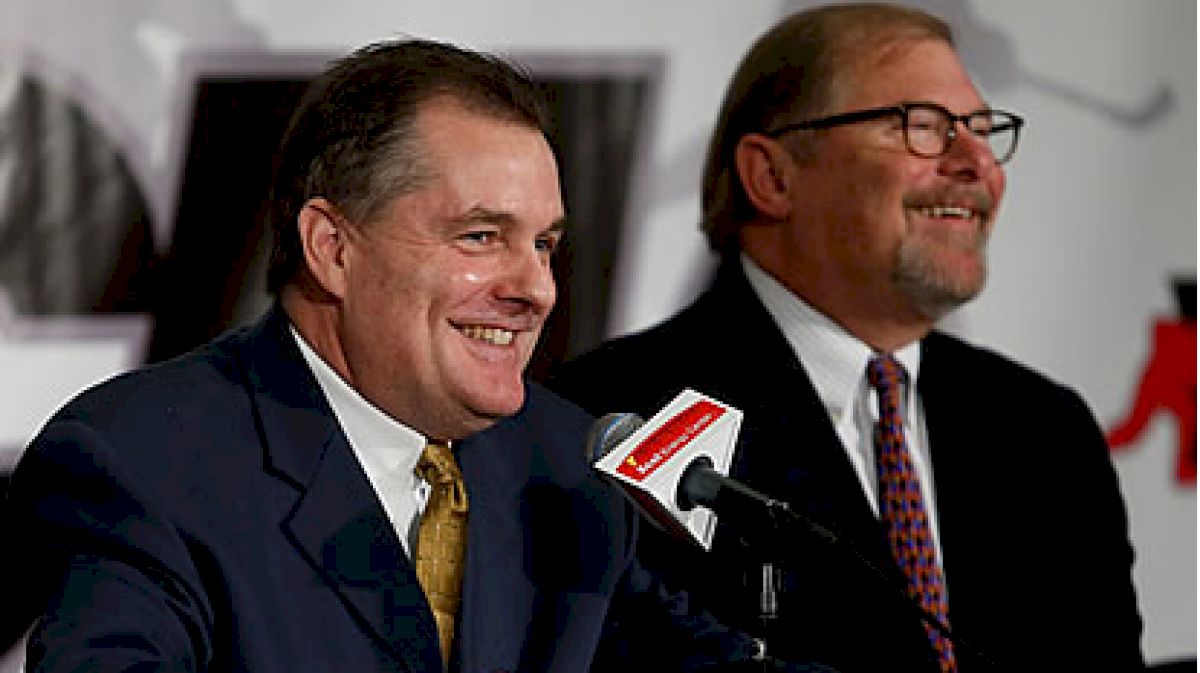WCHA Commissioner Bill Robertson Talks COVID-19, League Future & More
WCHA Commissioner Bill Robertson Talks COVID-19, League Future & More
FloHockey caught up with WCHA Commissioner Bill Robertson to talk about COVID-19 and the elephant in the room.

When it comes to crisis management in sports, WCHA Commissioner Bill Robertson has earned a PhD. The man affectionately known as “Billy Rob” was public relations director for the Mighty Ducks of Anaheim during the NHL’s 104-day lockout in 1994-95, and he held the same post for the Minnesota Wild when the NHL shut down their entire season a decade later.
Robertson needed all that experience to help manage the WCHA’s tumultuous 2019-20 season. It began on June 28 with seven of the 10 member clubs announcing they were bolting the league, and ended this past Thursday, March 12, when the COVID-19 pandemic forced the cancellation of the season. FloHockey’s Tim Rappleye caught up with the commissioner to gain some perspective from a guy who’s seen it all.
FloHockey: Billy Rob you’ve been through some extreme circumstances over your work life. Where does this season rank, based on how it started and how it ended?
Robertson: Both those events were the most unique and challenging times in my career. I’ve been involved in work stoppages at the professional level, I’ve seen all sorts of different stories play out in my career, but I’ve never faced anything like I have since June and what happened last Thursday.
Were you the first of the Division I hockey leagues to cancel the season?
I believe so. It was right at noontime, March 12. We had three conference calls on Thursday and two the night before figuring it all out — my phone was working overtime. The dynamics were changing on the fly, not only other leagues potentially closing, but also the health news, coronavirus cases continuing to grow. I know the decision we made as a conference was the right call at the right time. I’m sad about the coaches and the athletes who poured their hearts and souls into these jobs, and it ends abruptly.
There’s been a cloud hanging over the WCHA since “Black Friday” last June, when seven clubs announced they were leaving. Was this your most daunting season?
Yes. And the most unique. But I wouldn’t say it’s a cloud, because there were some very good things that happened to our league: Minnesota State was No. 1 for several weeks; both Alaska schools made the playoffs; the potential [for] Bemidji State to get to the NCAA tournament, as well as Michigan Tech and Bowling Green, all were on an uptick getting into the playoffs. I’m proud of our staff and the way they were able to manage through it.
You told the New York Times that you’ve spent parts of the year trying to save the WCHA, reaching out to other schools to fill the void in 2021.
I understand my duties as commissioner, but at the same time I’m always talking to different institutions about feasibility of them to join our coveted league. I’m a competitor and want us to succeed, and I’m hopeful the WCHA will continue for many years to come.
Back on June 28, did you have any inkling that seven schools were laying the groundwork to abandon the league?
I wasn’t prepared at that moment. I had heard rumblings for many years, prior to me taking the job as commissioner in 2014, that there was going to be additional shifts in college hockey. When it all came down, it came down very hard. I felt very bad for our staff and the member institutions it affects.
That must have been quite stressful.
There’s stress any time you don’t know the outcomes, and that’s what I’m really trying to figure out.
Is keeping spirits up within your office one of your roles?
Yes it is. As I [learned] with work-stoppages at the NHL level, I understand what it takes to keep people upbeat and happy. I try to be honest and ethical with them and do everything the right way. I believe that’s why we have the best support staff in college hockey.
You have been reduced to the proverbial “lame duck” status for next season. How will that affect your approach coming to work every day?
I have a job to do; it’s business moving forward. I’m representing 10 member institutions at this point, not just three. This is where you show your leadership abilities. I have to do everything by the book and be up front during these kinds of circumstances, that’s part of my DNA. I want this league to succeed; I’d like to have one or more of our 10-member institutions get to the Frozen Four next season.
At the same time, I’m looking at the potential future of the WCHA and what that could look like. There’s a lot on the table the next 15 months.
After the stunning bookends to this WCHA season — from “Black Friday” in June to “Black Thursday” in March — have you taken time to reflect on it all?
I do a lot of reflection, and I’m a man of faith. I have leaned on those core values to do the work. You become wiser and stronger from these situations. I have more to give, and will continue to do my very best as commissioner of the WCHA, and whatever’s ahead of me.
Tim Rappleye is the author of Jack Parker's Wiseguys: The National Champion BU Terriers, the Blizzard of '78, and the Road to the Miracle on Ice. He can be reached on Twitter @TeeRaps.